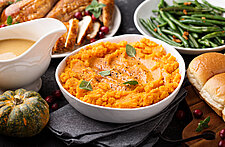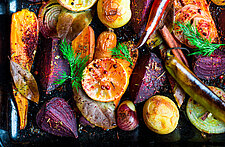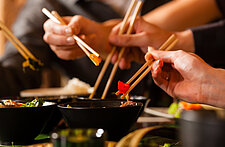By Junior Merino, The Liquid Chef
“When creating cocktails each ingredient AADS together to create the perfect balance. A- alcohol, A- acidity, D- dilution, S- sweetener.” - taken from the Junior Merino training manual for the Molecular Bar franchise/licensee program.
What acidity does for a drink, besides brightening the flavors, is to also stimulate the saliva and makes the person want to keep drinking, making that person either hungry or more thirsty. Now, when it comes to adding acidity to cocktails and mocktails, one tends to lean towards citrus juice such as lime, lemons, oranges, grapefruits, yuzu, kalamansi, etc. or peels of these fruits.
In 2005, on my way to Tokyo to do a presentation of healthy cocktails, I was asked to develop cocktails using vinegar for a high end spa in Japan, of which went extremely well and I understood they have been serving those drinks since then. However, the past couple of years has seen a resurrection of shrubs, or vinegar based syrups utilized in cocktails or mocktails. A shrub can easily be made with equal parts ripe fruit, sugar, and vinegar. I find that letting the mixture settle for about a week or so, mellows out the flavors and makes them more harmonious in cocktails. A shrub is a great trick to a flavorful cocktail, utilizing few ingredients that you would have on hand.
Traditionally shrubs were added to spirits, water or carbonated water and I find a combination of spirits and carbonated water to produce some of the most balanced cocktails.
Some ways I use vinegar in cocktails are:
- making a syrup using vinegar
- macerating fruits in the vinegar
- flash infusion of fresh herbs or fruits vinegars into the vinegar when it is hot
- blending fruits with vinegar
- by cooking it
- by reducing the vinegar then adding fruits once it has been reduced to keep the flavor of the fruit without caramelizing the flavors of the fruit.
- adding vinegar directly into the cocktail and balancing it with other elements
When selecting the vinegar base, it is important to keep in mind these factors: acidity of the vinegar, sweetness and fruits used to make the vinegar base.
I find using rice vinegar to be the best option as it isn’t as sharp as white vinegar or as pungent as apple cider vinegar. Another favorite go-to would be white balsamic vinegar. I also enjoy using aged balsamic vinegars for darker fruits and berries; however when using the aged balsamic, I prefer to do a reduction of the syrup to concentrate the nuances and to extract as much flavor from the fruits as possible. Since this is a concentrated syrup, I would use less in the cocktail to achieve palate “nirvana”.




